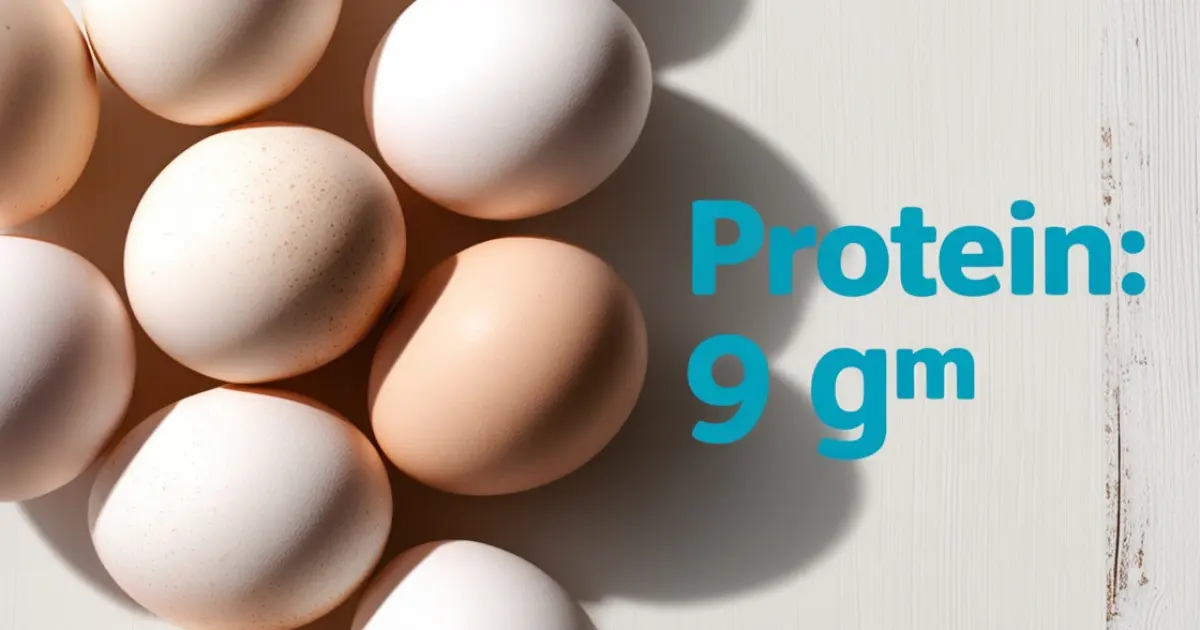Duck egg protein content is higher than that of a chicken egg, making it a great source of nutrition. In fact, duck eggs provide a significant protein boost, which makes them popular among athletes and health enthusiasts in the USA.
What Is Duck Egg Protein?
Duck eggs are known for their rich protein content, which is higher than that of regular chicken eggs. One large duck egg contains around 9 grams of protein, which is approximately 30% more than the amount found in a chicken egg. This extra protein makes duck eggs an excellent choice for those looking to increase their protein intake.
How Much Protein Is in a Duck Egg?
The protein in duck eggs is a complete protein, meaning it contains all nine essential amino acids your body needs. Each large duck egg provides about 9 grams of protein, compared to 6-7 grams in a large chicken egg. This high protein content is beneficial for muscle building, tissue repair, and overall health.
| Egg Type | Protein Content (grams) | Calories | Fat (grams) |
|
Duck Egg |
9 |
130 | 9.6 |
|
Chicken Egg |
6-7 |
72 |
5 |
| Quail Egg |
1.2 |
14 |
1 |
Benefits of Duck Eggs
Duck egg protein provides numerous health benefits. Some of the most notable include:
- Muscle Development: The high protein content aids in muscle growth and repair.
- Improved Immunity: Proteins in duck eggs contribute to the production of antibodies, boosting the immune system.
- Energy Support: Proteins help in maintaining energy levels by assisting in metabolic processes.
The rich nutritional profile of duck eggs also includes essential vitamins like vitamin B12, which supports brain function and energy production. This makes them an ideal food choice for anyone seeking a nutrient-dense diet. To learn about the benefits of duck eggs, check the article linked below:
Is Duck Egg Protein Better Than Chicken Egg Protein?

When comparing duck egg protein to chicken egg protein, duck eggs win in terms of sheer quantity. While chicken eggs are lower in calories and fat, duck eggs provide a higher dose of protein per serving, which is ideal for people who are looking to build muscle or need extra energy.
Moreover, duck eggs tend to have a richer flavor, making them a favorite for baking and cooking in certain recipes. For people who prioritize protein intake, duck eggs offer a more concentrated source of nutrition.
Health Benefits of Duck Eggs
Duck eggs are packed with nutrients that provide several health benefits, making them a valuable addition to any diet. Here are the key health benefits of consuming duck eggs:
1. High in Protein
One of the most notable benefits of duck eggs is their high protein content. With around 9 grams of protein per egg, they provide a complete source of protein, including all essential amino acids. This makes duck eggs ideal for muscle building, tissue repair, and maintaining overall strength.
2. Rich in Vitamins and Minerals
Duck eggs contain a wealth of essential vitamins and minerals such as vitamin B12, vitamin D, and selenium. Vitamin B12 supports brain function and energy production, while selenium boosts the immune system and fights oxidative stress.
3. Omega-3 Fatty Acids
Duck eggs have higher levels of omega-3 fatty acids compared to chicken eggs. These fatty acids are known for their heart-health benefits, reducing inflammation, and supporting brain health.
4. Great for Eye Health
With high amounts of vitamin A and lutein, duck eggs contribute to better eye health. Vitamin A supports clear vision, while lutein helps prevent macular degeneration, a condition associated with aging.
5. Promotes Bone Health
Duck eggs are a great source of calcium and phosphorus, which are essential for maintaining strong bones and teeth. Consuming regularly can help maintain bone strength and overall skeletal health.
To learn more about the nutritional value of duck egg check the article linked below:
The Protein in Duck Eggs vs. Other Sources
Duck eggs contain all the essential amino acids, making them a complete protein source, similar to other animal-based products like meat and dairy. For those on a high-protein diet, they are an excellent choice, and they offer some unique benefits that other protein sources may lack.
Can Duck Egg Replace Other Protein Sources?
Yes, duck egg can serve as a valuable replacement for other protein-rich foods, particularly for those who need more dietary protein or are looking for alternatives to red meat. They are also a versatile ingredient in cooking, making it easy to incorporate into meals. For example, scrambled, boiled, or poached duck eggs can provide a protein-rich breakfast or snack.
Duck egg is a potent source of nutrition, offering significantly more protein than chicken eggs. With around 9 grams of protein per egg, it’s an excellent choice for those looking to increase their protein intake while also enjoying the rich taste and versatile use of duck eggs in cooking. Whether for building muscle or supporting overall health, duck eggs provide high-quality protein that can easily fit into your daily diet.
External Resources
For more detailed nutritional guidelines and advice, visit these government and educational resources:



